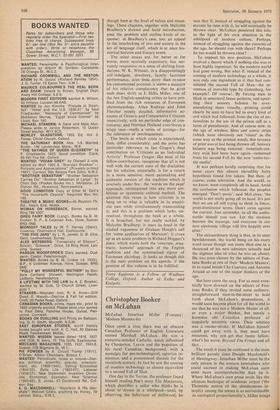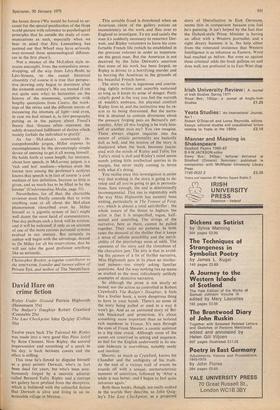Christopher Booker on McLuhan
Once upon a time there was an obscure Canadian professor of English Literature named Marshall McLuhan. He was a romantic-minded Catholic, much influenced by Chesterton, Leavis and the populism of his rural Canadian background, with a nostalgia for pre-technological, agrarian in- nocence, and a pronounced distaste for the twentieth century. In fact he saw the coming of modern technology as almost equivalent to a second Fall of Man.
One day in the 'forties, the professor found himself reading Poe's story The Maelstrom, which describes a sailor who thinks he is about to drown in a whirlpool—until, by observing the behaviour of driftwood, he sees that if, instead of struggling against the current he runs with it, he will eventually be thrown clear. McLuhan pondered this tale, in the light of his own situation in the whirlpool of modern culture. Perhaps, instead of struggling against the currents of the age, he should run with them? Perhaps he too would be thrown clear?
To support his new position, McLuhan evolved a theory which if nothing else was at least highly ingenious. So the modern world had gone wrong. But what if, instead of the coming of modern technology as a whole, it was only one ingredient in it that had con- stituted the second Fall of Man—the in- vention of movable type by Gutenberg, for example? Of course! By forcing men to think in unnatural linear patterns, and upset- ting their sensory balance by over- stimulating them visually, printing could clearly be seen to have led to every kind of evil which had followed, from the rise of na- tionalism to the use of the prison cell as a form of punishment. And of course now, in the age of wireless, films and comic strips (which were obviously not 'visual' in the same way as the printed word), this tyranny of print was at last being thrown off. Sensory balance was being restored : twentieth-cen- tury man had been born again—redeemed from his second Fall by the new 'audio-tac- tile media'.
It was perhaps hardly surprising that for some years this almost incredibly batty hypothesis found few takers. But then, of course, came television. And the world, as we know, went completely off its head. Amid the confusion which followed, the prophet emerged. 'Don't panic', said McLuhan, 'the world is not really going off its head. It's just that we are all still trying to think in linear, print-dominated terms. Don't swim against the current. Just surrender, to all the audio- tactile stimuli you can. Let the medium become the massage, and everyone in our new electronic village will live happily ever after.'
The extraordinary thing is that, in its utter bewilderment, the world hung on his every word (even though not more than one in a thousand of his new admirers actually had the slightest idea of what he was on about). He was even chosen by the editors of Fon- tana Books as one of their 'Modern Masters', tit to stand beside Che Guevara and Antonin Artaud as one of the major thinkers of the age.
But here came the snag. For as must even- tually have dawned on the editors of Fon- tana Books, if they invited some ordinary, straightforward man-in-the-street to hold forth about McLuhan's propositions, it would soon become plain for all the world to see that he was not a Modern Master at all, or even a major thinker, but merely a harmless old Canadian professor of singularly eccentric views. Their solution was a master-stroke. If McLuhan himself could get away with it, they must have reasoned, why not get that funny fellow, what's his name, Beyond The Fringe and all that ...
• The result it must be confessed is the most brilliant parody since Dwight Macdonald's of Hemingway. Jonathan Miller must be the only person in the western hemisphere who could succeed in making McLuhan seem even more incomprehensible than he is. Where McLuhan's own prose reads like the ultimate burlesque of academic jargon ('the Thomistic notion of the simultaneous in- terplay among the senses is as unvisualisable as analogical proportionality), Miller brings the house down ('We would be forced to ac- count for the special peculiarities of the Hopi world-picture with reference to psychological principles that lie outside the study of com- munications as such, especially when we bear in mind that Eric Lennenberg has pointed out that Whorf may have seriously over-stressed these epistemological differen- ces in the first place').
Not a nuance of the McLuhan style re- mains uncaught, from the compulsive name- dropping, all the way from Levy-Bruhl to Levi-Strauss, to the casual historical absurdity ('of course it is true that perspec- tive drawing only began to dominate after the sixteenth century'). We are treated (1 am not quite sure why) to lecturettes on the history of the mnemonic, complete with lengthy quotations from Cicero, the work- ings of the retina and the different means of measuring the intensity of light—and even, in case we had missed it, to two paragraphs putting us in the picture about Freud's theory that 'dreams often represent the subtly dramatised fulfilment of desires which society forbids the individual to gratify'.
As for McLuhan's notoriously in- comprehensible jargon, Miller exposes its meaninglessness by the devastatingly. simple device of seeming to get it all wrong himself. He holds forth at some length, for instance, about how speech, in McLooney jargon, is a 'rich and hot' medium—whereas even the merest tyro among the professor's acolytes knows that speech is in fact of course 'a cool medium of low definition, because so little is given, and so much has to be filled in by the listener' (Understanding Media, page 31).
Nevertheless, for all that, the charitable reviewer must finally concede that to write anything sane at all about the McLuhan phenomenon (described even by Miller himself as 'a gigantic system of lies') might well daunt the most lucid of commentators. One day perhaps such a book will be written, and it will be welcome, if only as an account of one of the more curious paranoid systems evolved in our century. But certainly its author will begin with the advantage, denied to Dr Miller for all his reservations, that he will not take the good professor anything like so seriously.
Christopher Booker, a regular contributor to the SPECTATOR, founder and former editor of Private Eye, and author of The Neophiliacs.


































 Previous page
Previous page